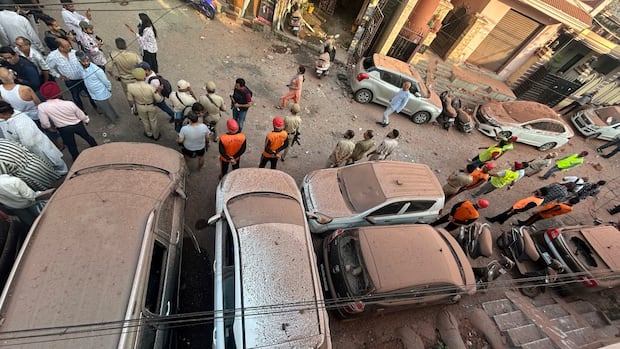Pakistan said India fired missiles at three air bases inside the country Saturday but most of the missiles were intercepted and that retaliatory strikes on India were underway. It’s the latest escalation in a conflict triggered by a massacre last month that India blames on Pakistan.
The Pakistani military said it used medium-range Fateh missiles to target an Indian missile storage facility and air bases in Pathankot and Udhampur.
Pakistani army spokesperson, Lt. Gen. Ahmad Sharif, said in a televised address that the country’s air force assets were safe. He added that some of the Indian missiles also hit India’s eastern Punjab.
“This is a provocation of the highest order,” Sharif said.
Tensions between the nuclear-armed rivals have soared since an April 22 attack at a popular tourist site in India-controlled Kashmir left 26 civilians dead, mostly Hindu Indian tourists. New Delhi has blamed Pakistan for backing the assault, an accusation Islamabad rejects.
The Indian missiles targeted Nur Khan air base in the garrison city of Rawalpindi, near the capital Islamabad; Murid air base in Chakwal city; and Rafiqui air base in the Jhang district of eastern Punjab province, according to Sharif, the spokesperson for Pakistan’s army.
Front Burner22:53Dozens dead as India and Pakistan clash
There was no immediate comment from India. Sharif said some of the Indian missiles also went into Afghanistan.
“I want to give you the shocking news that India fired six ballistic missiles from its city of Adampur,” said Sharif. “One of the ballistic missiles hit Adampur, the remaining five missiles hit the Indian Punjab area of Amritsar.”
State-run Pakistan Television reported that Prime Minister Shehbaz Sharif has convened a meeting of the National Command Authority, the body responsible for overseeing the country’s missile program and other strategic assets.
Hours before Pakistan’s claim of India launching missiles into its territories to target air bases, Indian Prime Minister Narendra Modi held a meeting with top security officials, including defence minister Rajnath Singh, national security adviser Ajit Doval and the chiefs of the army, navy and air force.
A video released by Modi’s office overnight showed one of the Indian military officials taking notes of the discussion. The video did not include sound.
‘It looks like a war here’
Residents in Indian-controlled Kashmir say they heard loud explosions at multiple places in the region, including in the two big cities of Srinagar and Jammu, and the garrison town of Udhampur.
“Explosions that we are hearing today are different from the ones we heard last two nights during drone attacks,” said Shesh Paul Vaid, the region’s former top police official and a resident of Jammu. “It looks like a war here.”

Vaid said explosions were heard from areas that have military bases, adding that it appeared army sites were being targeted.
There was no immediate comment from India’s defence and foreign ministry and its armed forces.
Srinagar resident Mohammed Yasin said he heard at least two explosions. “Our home shook and windows rattled,” he said.
Srinagar appeared calm on early Saturday, but some residents in neighbourhoods close to the city’s airport, which is also an air base, said they were rattled by the explosions and booming sound of fighter jets.
Fears are mounting of an all-out war between India and Pakistan after India fired missiles into Pakistan-controlled territory, killing dozens of people. Andrew Chang breaks down the escalation of this longstanding conflict, which was reignited by last month’s deadly attack in the contested region of Kashmir, and the concerns experts are raising about the risks of further violence.
“I was already awake but the explosions jolted my kids out of their sleep. They started crying,” said Yasin.
Despite the Indian attacks, life in Pakistan’s major cities remained normal on Saturday morning, though the country’s civil aviation authority said all airports have been shut for all flight operations.
As soon as people learned that Pakistan had finally carried out a retaliatory strike, people were seen raising slogans in support of Pakistan’s armed forces.
“Thank God we have finally responded to Indian aggression,” said Muhammad Ashraf, 28, who had come to Lahore’s Anarkali Bazaar in the morning for breakfast.
In the city of Multan, Punjab, a young man named Muhammad Rizwan said the Pakistani armed forces had won the hearts of the entire nation.
“The entire Pakistani nation is united against Indian aggression,” he said.
In Peshawar, Karachi, and all major cities, people were seen chanting slogans in support of the army and the country.
Prior events
The Indian army said late Friday that drones were sighted in 26 locations across many areas in Indian states bordering Pakistan and India-controlled Kashmir, including the region’s Srinagar main city. It said the drones were tracked and engaged.
“The situation is under close and constant watch, and prompt action is being taken wherever necessary,” the statement added.
India and Pakistan have traded strikes and heavy cross-border fire for days, resulting in civilian casualties on both sides.
The Group of Seven nations, or G7, urged “maximum restraint” from India and Pakistan. It warned Friday that further military escalation posed a serious threat to regional stability.

